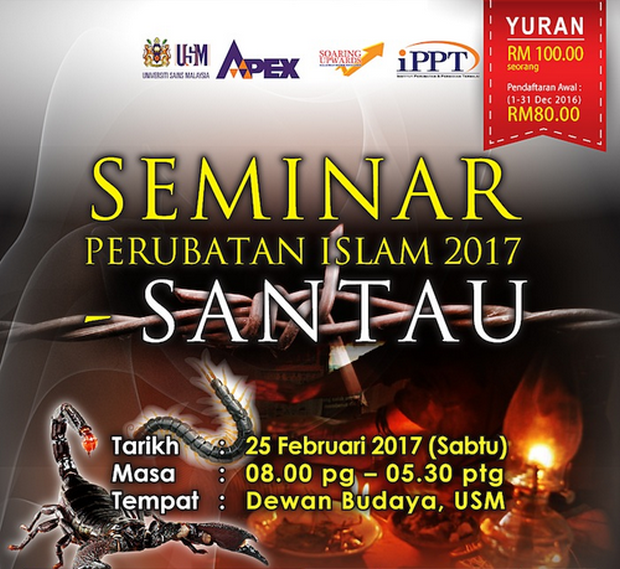KUALA LUMPUR, Jan 5 — Universiti Sains Malaysia (USM) in Penang confirmed today it will not continue hosting an inaugural day-long seminar aiming to explain the so-called scientific aspects behind “santau”, the Malay supernatural act of curse and poisoning.
In a statement on its website, USM said the seminar originally scheduled for February had been suggested by several of its staff with an interest in Islamic healing, which the university has decided is neither its priority nor focus.
“The matter has been reviewed by the university, in looking at it as being a non-priority and not an area of strength focused upon by the university, especially at the USM Advanced Medical and Dental Institute (IPPT),” it said.
IPPT was previously named as the organiser of the seminar. A check by Malay Mail Online today found that the seminar’s website has been removed from IPPT’s homepage.
USM said its focus is to develop its strength in fields where it is an academic and research expert, and IPPT is currently developing itself in the field of oncology.
“Therefore, the focus of any discussion, scholarly discourse and academic conference would be in areas of strength from the expertise offered by USM academics,” it added.
On Monday, Malay Mail Online reported the seminar, which would feature religious speakers from Selangor International Islamic University College (KUIS) and the Penang chapter of popular faith healers Darussyifa’.
In Malay culture, “santau” is an act of delivering curse and poison through black magic, among others by getting the victim to ingest a mixture of poison and shards, directing a djinn to infiltrate the victim’s body, or to bury a cursed object nearby the victim’s location.
Before the advent of modern medicine, malicious black magic involving malevolent “makhluk halus” (fairies, or “unseen beings”) such as djinns were often blamed by the Malay community for ailments that were then treated using exorcisms.
Historically, the Malays would consult a bomoh or pawang, a shaman who mixes ancient pagan and Islamic teachings, but the role is now increasingly undertaken by pseudo-scientific faith healers.
In November 2014, Universiti Kebangsaan Malaysia’s Faculty of Social Sciences and Humanities organised a regional forum to help local Muslim doctors reconcile their beliefs in spiritual beings and black magic with modern medicine.
Last year, Universiti Malaysia Pahang started selling a RM8,750 “anti-hysteria kit” comprising of chopsticks, salt, lime, vinegar, pepper spray, and formic acid, that it claims can ward off “evil spirits” — after announcing a Standard Operating Procedure to combat the use of witchcraft.



















